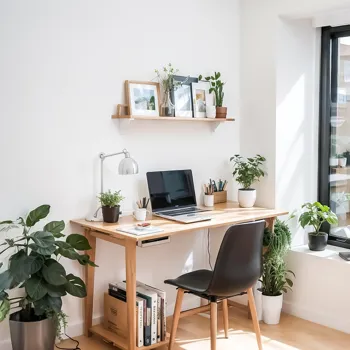10 Simple Changes for Better Work-Life Balance. Learn how small adjustments can transform your daily routine. Read on!
In today's fast-paced world, it's become increasingly difficult to juggle the demands
of work and personal life. Many of us find ourselves constantly connected to our jobs, even outside of working hours, leading to burnout and a diminished quality of life.

But don't worry, achieving a better work-life balance isn't about making drastic changes. It's about incorporating small, manageable habits and adjustments into your daily routine. Here are 10 simple changes you can make to create a more fulfilling and balanced life.
Setting clear boundaries is key to work-life balance: establish work hours, avoid after-hour work, learn to say no
One of the most crucial steps in achieving work-life balance is setting clear boundaries between your professional and personal life. This means establishing specific work hours and sticking to them as much as possible.

Avoid checking emails or taking work calls outside of these hours, unless it's a genuine emergency. Let your colleagues and clients know your working hours so they respect your time.
This boundary setting helps ensure that your personal time remains truly personal, allowing you to recharge and focus on other important aspects of your life like family, hobbies, and relaxation.
Learning to say "no" to extra work commitments when you're already stretched thin is also a vital part of boundary setting. Remember, protecting your time is protecting your well-being. It's about making a consious effort, not a complex one to avoid mental exhaustion.
Prioritize tasks for better work-life balance, reduce stress
Feeling overwhelmed is a common symptom of poor work-life balance. To combat this, learn to prioritize tasks effectively. Start by making a list of everything you need to accomplish, both at work and at home. Then, use a method like the Eisenhower Matrix (urgent/important) to categorize your tasks.
Focus first on the urgent and important tasks, followed by those that are important but not urgent. Delegate or eliminate tasks that are neither urgent nor important.
By prioritizing your tasks, you'll feel more in control of your workload, reducing stress and freeing up time for personal activities. Try to finish the most crucial tasks first, this helps you to calm down later during the end of the day. This process is very effective and most people admire it.
Take regular breaks for productivity and stress relief
Working for long stretches without breaks can lead to decreased productivity and increased stress. Schedule regular breaks throughout your workday, even if it's just for a few minutes. Get up from your desk, stretch, take a short walk, or simply close your eyes and breathe deeply.

During longer breaks, step away from your work completely and do something you enjoy, such as reading, listening to music, or chatting with a colleague. These short breaks can help you refresh your mind and body, making you more focused and productive when you return to work.
During lunch breaks, it is advisable to meet friends. Taking short breaks increases a person's lifespan and also reduces the risk of heart attack.
Embrace the power of "no" to prioritize well-being and set boundaries
Many of us struggle to say "no" to additional commitments, whether it's taking on extra work projects or attending social events we don't really want to go to. However, constantly saying "yes" can lead to burnout and leave you with little time for yourself.

Learn to embrace the power of "no" and politely decline requests that don't align with your priorities or that will overextend you. It's okay to prioritize your own well-being and say "no" to things that don't serve you.
People will likely respect your boundaries and understand your need to protect your time. If you are not sure how to say no, be genuine when telling those that are asking the favor. This helps people understand that you are sorry and you are being real with them
Delegate tasks to free up time and empower others
If you're feeling overwhelmed by your workload, explore opportunities to delegate tasks to others. This could involve delegating work tasks to colleagues or outsourcing personal tasks like cleaning or errands.
Delegating not only frees up your time but also empowers others to take on new responsibilities and develop their skills. Don't be afraid to ask for help when you need it. Remember, you don't have to do everything yourself.
Try to be mindful that delegating tasks means entrusting responsibility and it is up to the person to do it for you. Always remember to ask with a smile because that is human nature
In today's digital age, it's easy to stay connected to work and social media 24/7. However, constant connectivity can be detrimental to your work-life balance. Make a conscious effort to disconnect and unplug from technology, especially during your personal time. Turn off notifications, put away your phone, and resist the urge to check emails. Use this time to engage in activities you enjoy, spend time with loved ones, or simply relax and unwind. Disconnecting from technology can help you reduce stress, improve sleep, and reconnect with yourself and the people around you.
By implementing these ten simple changes into your daily life, you can create a more balanced and fulfilling existence, enjoying both your professional and personal pursuits to the fullest.
AI Generated Content. Glance/InMobi shall have no liability for the content


















